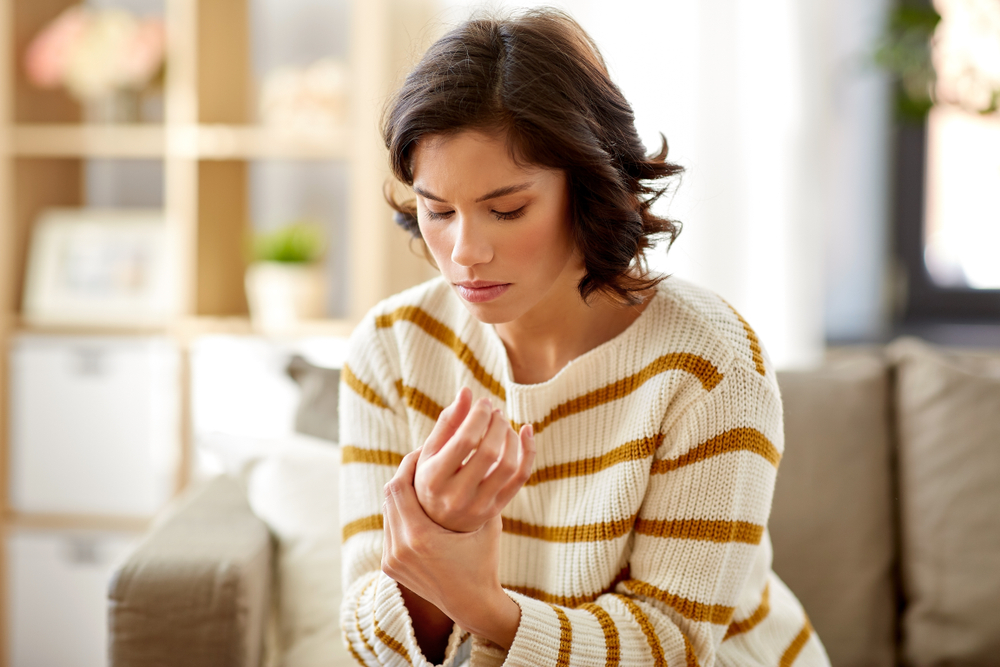Postpartum aches and pains can be numerous, ranging from hip and pelvic pain to neck and back pain. While hand and wrist pain is not a postpartum symptom most would list, it can be a common symptom. In fact, about 33% of all pregnant women report hand and wrist pain. This kind of pain can be an immense obstacle for the postpartum mother; between holding a baby and picking up objects, hand pain can make any postpartum task feel challenging.
Thankfully, there are several treatment options for postpartum hand pain, including physical therapy. By learning about the possible reasons behind your hand pain, you and your physical therapist can better pinpoint a treatment plan that addresses your symptoms.
Why women’s hands may hurt after childbirth
About 14% of people experience hand pain, and women are more likely to experience hand pain than men. However, pregnant and postpartum women may be more likely to experience hand pain than other women.
Due to the immense stress that babies can put on a woman’s body, many factors may contribute to women’s hands hurting after childbirth. If you’re one of these women, you may be experiencing:
- Carpal tunnel syndrome — During pregnancy, women produce an excess amount of relaxing hormones. This hormone allows the woman’s pelvis to expand during pregnancy and makes it possible for her body to accommodate the baby. Despite the benefits of this hormone, it can cause retention of fluid, which can cause pressure on not only the pelvis but on other structures such as the nerve in the wrist. Carpal tunnel syndrome is when the nerve in the wrist is squeezed. This may cause a great deal of pain.
- De Quervain’s tenosynovitis — During and after pregnancy, accumulation of fluid and hormonal changes can occur. These symptoms can lead to De Quervain’s tenosynovitis, which is when tendon sheaths in and around the thumb become inflamed. This may cause pain in the thumb and on the thumb side of the wrist.
- Overuse of the hands during the postpartum period — This may seem like an obvious cause. Overuse is a great contributor to hands hurting postpartum: Frequently changing diapers; cleaning up; and holding, feeding, and changing the baby can cause excess stress on the hands, which may cause your postpartum hand pain. If not addressed, such overuse can cause other hand, wrist and elbow conditions.
What can physical therapy do for postpartum hand pain?
A physical therapist can evaluate your medical history, work life, and the mobility and strength of your hands. Knowing these factors can help you better understand and manage your postpartum hand pain and how to prevent flare-ups. Physical therapists can also guide you on effective exercises and tips that you can implement while at home or at work.
In addition to going to physical therapy sessions, your physical therapist may recommend that you:
- Make ergonomic changes — If you are constantly making repetitive hand movements, you can be at a higher risk of developing overuse injuries like carpal tunnel syndrome. You can help prevent carpal tunnel syndrome symptoms by making small ergonomic changes in your environment. For example, you can adjust your body mechanics, like making sure your forearms and hands are in line with your elbows while holding your baby and other objects.
- Exercise — Incorporating hand exercises into your daily routine can help you build muscle and tendon strength. Building hand strength can support your hands while you perform hand-intensive activities such as swaddling your newborn or holding up a bottle. Doing so can also encourage blood flow to your hands and decrease inflammation if your hands are feeling especially painful. As a result, strengthening hand exercises can decrease your risk of developing carpal tunnel syndrome and other conditions. Squeezing a stress ball between one-on-one sessions with your baby can offer a quick and convenient whole-hand exercise.
- Take breaks — Since overuse is one of the most common hand pain causes, scheduling breaks can be crucial. Try to incorporate regular breaks in your and your baby’s schedule — like nap time — that give you the opportunity to ease pressure from your hand. Doing so can also help you prevent the repetitive strain that often leads to carpal tunnel syndrome symptoms and other hand issues.
- Stretch — Breaks can also provide opportunities for you to stretch your hands while caring for your baby postpartum. A study showed that performing hand stretches can significantly reduce hand pain. This is because hand stretches can release muscular tension, break up inflammation, relieve stiff joints and ease pressure on the median nerve.
Find out how SSOR can help treat your hurting postpartum hands
SSOR can help treat your postpartum hand pain. Your hands can receive incredible treatment through our individualized treatment plans by our experienced, licensed physical therapists. Our detail and goal-oriented mindset can help you to restore joy and efficiency in caring for your child while also helping you to take care of yourself.
Contact us today for more information about how we can help your postpartum hand pain or to schedule an initial appointment.
